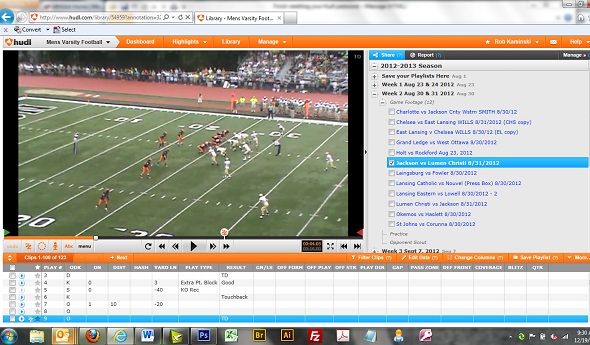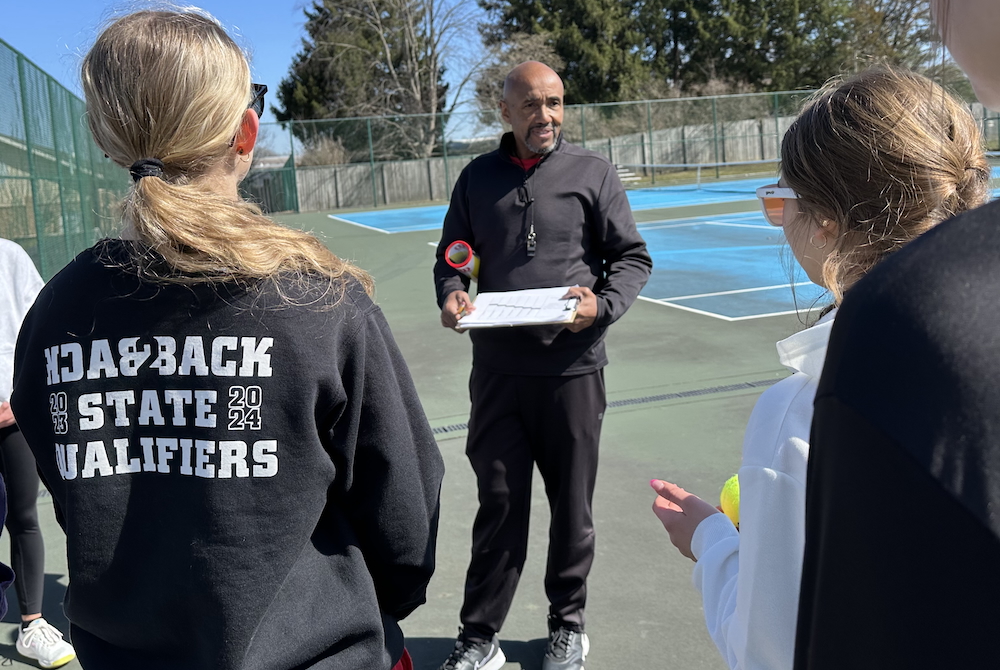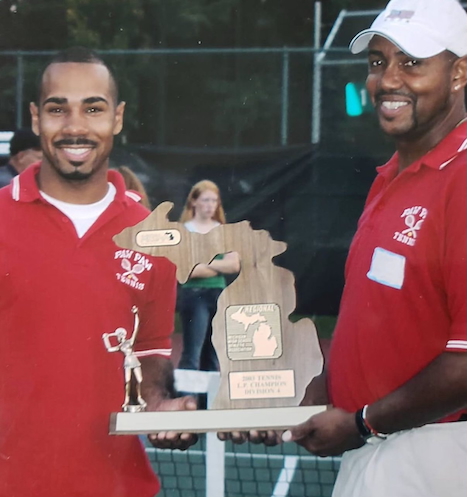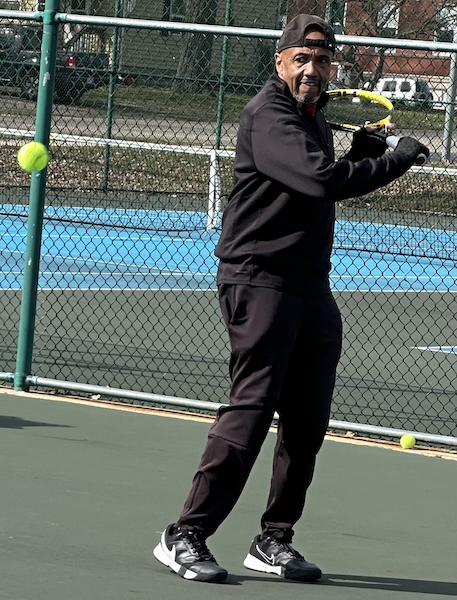
The Changing Face(book?) of Coaching
March 26, 2013
By Rob Kaminski
MHSAA benchmarks editor
From online video exchange programs such as hudl.com to social media platforms like Facebook, Twitter, and LinkedIn, the face of coaching and communicating with teams is ever-changing. How much is too much, and how are the new tools being used by the old guard?
With increasing frequency, today’s coaches are turning to technology to assist in their endeavors, particularly in video review and data compilation, as the number of programs available to them seems to grow on a daily basis.
Among the recent leaders, hudl.com seems to have won the favor of football coaches across the state, reducing video exchange and study to a couple clicks of the mouse.
Several members of the MHSAA Student Advisory Council report that their football coaches use the web-based program, and even local officials associations are using it for film study.
Similar programs are making it easier for today’s coaches to analyze data and compile statistics as well.
“The dispensing of information is much quicker than it used to be,” said Marshall bowling coach Sue Hutchings. “We use a scoring software for our stats.”
In more “visual” sports such as competitive cheer, online video is now essential.
“Video playback and feedback to athletes has helped the sport 10-fold,” said Middleville Thornapple-Kellogg coach Abby Kanitz.
In some cases, coaches are taking the lead on such initiatives.
“I run the MISCA (Michigan Interscholastic Swim Coaches Association) website and receive plenty of positive feedback about us posting meet results and top times reports,” said Bloomfield Hills Andover coach David Zulkiewski. “I also visit MHSAA.com weekly. Since I run the MISCA website, I want to make sure I have accurate and up-to-date information posted.”
Technology has also made the world a bit “greener” even in the small corner that is interscholastic athletics. From the required MHSAA rules meetings moving to an online format, to volumes of data now stored on flash drives rather than in file cabinets, coaches are realizing savings in both time and cost.
“The current state of track and field and cross country is so much more manageable than when I began,” said East Kentwood’s Dave Emeott. “I remember compiling actual papers from all over the state to keep track of the opposition, and now thanks to Athletic.net we have this access at the tip of our fingers. These programs have also replaced nights spent inputting data and record-keeping. I am sure I have replaced all that time elsewhere, but it is probably spent with kids and not with data.”
With the saturation and availability of these reports around the clock also comes temptation for those who are driven, and even obsessed, with such numbers. Coaches can rank near the top of that list.
“Technology can be extremely helpful and time-saving for coaches and teachers,” said Grand Haven wrestling coach James Richardson. “But, the disadvantage is the coaches and athletes have a more difficult time getting away from the sport, as we have access to so much information, and others have more access to us. This can lead to too much time being devoted to our sport.”
It also might even take some of the fun out of the actual competition.
“I think the one negative side of technology is the lack of the unknown,” Emeott said. “There was a day when we would enter a meet and not really know how the day would turn out. Now I have most meets scored within 10 points the day before we arrive.”
At times, such advance information also can lead to overconfidence heading into competition.
“Currently the MHSAA Final draw is posted online, and my players often see it and draw their own conclusions before I have a chance to talk to them about it,” said Allegan tennis coach Gary Ellis. “In the past, I was able to present their draw in the light in which I wanted them to see it.”
Another side effect is the indirect push to play beyond high school.
“There is a lot more social promotion and glamourizing of the athletes,” said Mike Van Antwerp, Holt lacrosse coach. “The recruiting pressure has increased tremendously, which is causing kids to commit earlier and go to great lengths to have a chance at being recruited.”
The world has indeed become a smaller, more familiar place. Not only can students and coaches learn pertinent statistics relating to any given opponent, they can also learn personal information about their competition through the deluge of social media vehicles.
It is in this realm where the greatest divide exists between coaches and their athletes when the subject of technology comes up.
Several members of the MHSAA Student Advisory Council indicate that their coaches do not use social media to assist with the daily activities involved with their sport, while others are but only on a limited basis.
It’s not that the coaches don’t know about Facebook, Twitter, LinkedIn, or the other platforms. More likely, they are all too well versed in the abuses of such mediums by young adults not yet ready to understand the lasting ramifications of a random tweet or damaging photo.
“We have specific rules for use of cell phones at practice, games, in the locker room, etc.,” said Diane Laffey, athletic director and coach at Warren Regina. “We also have a form for parents to sign if they want the coach to be able to text their daughter about practice or game cancellations or changes. We stress that the texting only be for necessary things, and the parents are to give permission.”
Safeguarding against the misuse of handheld devices is becoming as commonplace as handing out uniforms prior to the season.
“By rule, our players aren’t allowed to bring electronic devices to the court with them. We restrict cell phone usage at practice,” said Portage Central tennis coach Peter Militzer. “Players must ‘friend’ the coach on either Facebook or Twitter, and I monitor their activities to make sure their language and behavior meets our standards. We restricted a player’s opportunity to play on varsity last season due to excessive use of crude language and an offensive user name on Twitter.”
PHOTO: This is a screenshot from Hudl.com, an online service used by high school football coaches for video analysis and archiving.

Vicksburg's Offord Jr. Beginning 50th, Final Season Coaching Teams to Net Gains
By
Pam Shebest
Special for MHSAA.com
March 26, 2025
VICKSBURG — Warner Offord Jr.’s was hardly impressed the first time he played tennis.
 That was 55 years ago, when he was heading into his sophomore year at Paw Paw High School.
That was 55 years ago, when he was heading into his sophomore year at Paw Paw High School.
Still, he continued to play with neighbor boys all that summer, and figured it would end there – until the following spring sports season, when he joined the tennis team.
“I go, it’s not a bad sport after all,” he laughed.
Offord ended up at No. 1 singles his final three years at Paw Paw, graduating in 1973.
Now, at age 70, he is ready to retire at the end of the upcoming Vicksburg’s girls season after 50 years of coaching tennis.
After graduating from Paw Paw, Offord stayed in the area, helping the basketball team and coaching boys and girls tennis there. He coached at his alma mater 28 years, first as an assistant before taking over the tennis programs.
When he heard about a basketball coaching opening at Vicksburg 22 years ago, he applied for the job.
He did not get the head hoops gig, but athletic director Mike Roy offered him a job coaching the girls tennis team.
“I said I’ve got to talk to my wife (Linda Connor-Offord),” Offord said. “I don’t do nothing without talking to my wife, or I’ll be in the doghouse.”
Two days later, the boys tennis coach resigned and Roy offered Offord that job as well.
 Once again he consulted his wife, who he gave him the thumbs up.
Once again he consulted his wife, who he gave him the thumbs up.
Offord soon discovered there is a bit of a difference between coaching boys and girls.
“Girls are feisty,” he said. “Girls listen to you. Boys, sometimes they want to do their own thing. When they do that, I say ‘end zone to end zone’ and then they get back to, ‘OK, we’re going to listen to our coach now.’”
He also has rules on the court.
“I believe in discipline. If you curse on the court, it’s an automatic two miles,” he said. “If you throw your racket, it’s an automatic two miles.
“No matter what, we’re going to run. I try to get the kids in shape for the third set.”
With the girls season just underway, Offord has some definite goals.
“We’re going to try to win (Wolverine) conference for the first time in school history,” he said. “The boys did it last year for the first time.
“Before I leave, I’d like to bring home that Regional trophy for the girls. It would be nice to bring home that trophy my last year.”
He is also challenging the girls not only to get back to the MHSAA Finals, but to improve on last year’s finish.
“Two years ago we finished 18th (in Lower Peninsula Division 3). Last year, I told the girls, let’s get up to 15th of 24 teams, and we got 14th.
“This year, if we go to state again, I’m going to tell then, let’s get down to 10.”
Game changer
Offord said today’s high school players are faster and stronger than when he picked up tennis because they use the weight room and do conditioning.
The equipment also has evolved.
“If I had the racket they have now and I could take that back in the ’70s, the racket is so big,” he said. “I had an Arthur Ashe (wooden) racket, I had a Wilson T3000 racket, I had a Kramer and I had a Davis.
“The technology now is unbelievable.”
Offord, who is affectionately called “Doctor O” or the abbreviated “Doc O” by the Vicksburg community, has changed with the times.
 “Dr. O’s unwavering passion and exceptional dedication have transformed the program,” Roy said. “His deep understanding of the game, paired with his ability to teach strategy at an elite level, sets him apart.
“Dr. O’s unwavering passion and exceptional dedication have transformed the program,” Roy said. “His deep understanding of the game, paired with his ability to teach strategy at an elite level, sets him apart.
“Beyond his technical expertise, Dr. O instills a culture of excellence by holding athletes to high standards while maintaining fairness, consistency, and approachability – earning the trust and respect of his team.”
Roy noted that Offord has support around him.
“Since taking the reins, Dr. O has cultivated a winning culture, building on the foundation laid by coach Scott Wills, who continues to lead our summer youth programs,” Roy said.
“Recognizing the importance of strong leadership, Dr. O brought in Nick Foley, a former standout at Sturgis, as his assistant. Together these three men have ignited a culture shift, elevating the team to compete at an exceptional level. Their collective vision, tireless work ethic and commitment to growth has positioned the program for sustained success.”
Offord said he learned from the coaches he had growing up, who instilled not only a competitive spirit but confidence in playing and acceptable conduct on the court.
He mentioned retired Allegan tennis coach Gary Ellis as a mentor.
“Anytime I needed to know anything about tennis, I’d call him and he always had the answer,” Offord said. “I thought the world of him and what he did for that program. I’m trying to do the same thing at Vicksburg.”
Ellis said that Offord “definitely got the kids excited about playing tennis for Vicksburg and enjoying the sport. His kids get better and better during the season.”
The players at Vicksburg and Paw Paw are not the only ones who blossomed under Offord’s coaching.
His son, Warner Offord III, is an assistant to Matt Boven at Mattawan and has been a certified tennis pro for 20 years.
One final run
Offord Jr.’s decision to retire after half a century came at a perfect time, said senior Scarlett Hosner, the Bulldogs’ No. 1 singles player.
 “I feel it’s a good ending point because he coached my sister (Josephine, a 2016 grad), too, and he saw me growing up playing tennis,” Hosner said. “It’s like a full-circle moment because it’s my last year and his last year.
“I feel it’s a good ending point because he coached my sister (Josephine, a 2016 grad), too, and he saw me growing up playing tennis,” Hosner said. “It’s like a full-circle moment because it’s my last year and his last year.
“He brings really positive energy. He’s such a nice, fun guy. He makes us enjoy the game, but he can also be serious at times. When we’re not doing what we’re supposed to be doing, he’s like getting on us.”
In retirement, Offord and his wife plan to do some traveling because “we want to enjoy life while we’re young,” he said.
“It’s been a wonderful 50 years coaching tennis, and it’s going to be sad. It hasn’t hit me yet for the boys, and once the girls season is over, then it will probably really hit me.
“I take great pride in seeing my players excel professionally, academically and as an athlete. I feel good knowing I played a part in that person’s success.”
 Pam Shebest served as a sportswriter at the Kalamazoo Gazette from 1985-2009 after 11 years part-time with the Gazette while teaching French and English at White Pigeon High School. She can be reached at pamkzoo@aol.com with story ideas for Calhoun, Kalamazoo and Van Buren counties.
Pam Shebest served as a sportswriter at the Kalamazoo Gazette from 1985-2009 after 11 years part-time with the Gazette while teaching French and English at White Pigeon High School. She can be reached at pamkzoo@aol.com with story ideas for Calhoun, Kalamazoo and Van Buren counties.
PHOTOS (Top) Vicksburg girls tennis coach Warner Offord Jr. talks with his team at the start of this spring season. (2) Offord and son Warner Offord III hold up their Regional championship trophy won for Paw Paw in 2003. (3) Offord hits with his players during practice. (4) Scarlett Hosner headshot. (Current photos by Pam Shebest; 2003 photo courtesy of Warner Offord Jr.)

